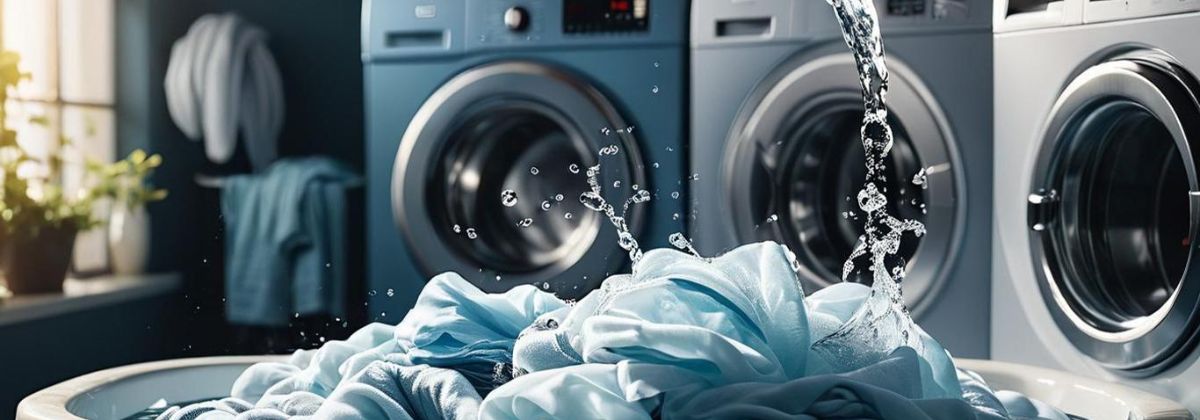08 May The Secret to Soft, Fresh Laundry: Softening Hard Water
Hard water can damage your clothes, making them feel stiff and dull. But it’s OK! There’s a simple solution to this age-old problem: softening hard water. Let’s explore the science behind hard water, its impact on laundry, and effective methods to soften it for cleaner, softer clothes.
Softening Hard Water
Hard water contains high dissolved minerals, primarily calcium and magnesium ions. These minerals are naturally present in groundwater sources. They are picked up as water flows through soil and rock formations rich in calcium and magnesium carbonate.
When hard water is used for laundry, the minerals can interact with laundry detergents in several ways. Firstly, they can reduce the effectiveness of detergents by forming insoluble compounds, preventing them from entirely dissolving and interacting with dirt and stains on clothing.
Secondly, the minerals can adhere to the clothing fibres during washing, leaving behind a residue that makes fabrics feel stiff, scratchy, and less absorbent. This residue can also contribute to the dulling of colours over time, as it forms a barrier that prevents dyes from fully penetrating the fabric fibres.
Hard water can affect the cleanliness and feel of laundry and also negatively affect washing machines. The minerals in hard water can build up inside the machine, forming scale deposits on internal components such as heating elements and pipes.
- Stiff and Scratchy Fabrics: One of the most common signs of hard water in laundry is that clothes feel stiff and scratchy, even after they’ve been washed. This is because the minerals in hard water can adhere to the fabric’s fibres. They leave a residue that makes the fabric feel rough.
- Faded Colours: Hard water can also contribute to the dulling of clothing colours over time. The minerals in hard water can form a barrier on the surface of fabric fibres, preventing dyes from fully penetrating the fibres and leading to colours that appear faded or less vibrant than they should be.
- Soap Residue: Another indication of hard water in laundry is the presence of soap residue on clothes after they’ve been washed. Hard water can interfere with the ability of detergents to fully dissolve and rinse away, leaving behind a soapy film on fabrics that can make them feel sticky or greasy.
- Difficulty Lathering Detergent: When washing laundry in hard water, you may notice that detergents should lather better. The minerals in hard water can react with the surfactants in detergents, inhibiting their ability to produce suds and effectively clean clothes.
- Reduced Absorbency: Fabrics washed in hard water may also experience reduced absorbency, as the mineral residue left behind by hard water can create a barrier on the surface of the fibres. This can make towels and other absorbent items less effective at soaking moisture, leading to longer drying times and less satisfactory results.
Methods for Softening Hard Water
Several effective methods are available for softening hard water, ensuring your laundry always comes out clean and fresh.
- Water Softeners: Water softeners are devices specifically designed to eliminate minerals such as calcium and magnesium from hard water. They operate on an ion exchange mechanism, replacing the minerals with sodium or potassium ions.
- Laundry Detergents with Built-in Softeners: Many laundry detergents now have built-in water-softening agents. These detergents are specially formulated to tackle hard water challenges, preventing mineral buildup on clothes and leaving fabrics feeling soft and clean.
- DIY Remedies: DIY remedies can help soften hard water if you prefer natural alternatives. Common household ingredients like vinegar, baking soda, and lemon juice can neutralize minerals in the water, improving its quality for laundry purposes. These DIY solutions are not only cost-effective but also environmentally friendly.
- Magnetic Water Conditioners: Magnetic water conditioners are another alternative for softening water. These devices use magnetic fields to alter the structure of minerals in the water, reducing their ability to cause hardness. Magnetic water conditioners are relatively easy to install and maintain. But their effectiveness in softening water for laundry purposes may vary.
- Reverse Osmosis Systems: Reverse osmosis systems are typically used for purifying drinking water but can also be effective at softening water. These systems force water through a semipermeable membrane, removing impurities, including minerals. However, they can be expensive to install and may not be practical for softening water solely for laundry purposes.
Benefits of Soft Water in Laundry
Soft water offers various benefits when it comes to doing laundry. Soft water is essential for achieving optimal cleaning results and prolonging the lifespan of your clothes.
- Improved Fabric Lifespan: Soft water helps preserve the integrity of fabrics by preventing mineral buildup. Hard water can make fabrics stiff and rough over time, leading to premature wear and tear. Soft water, on the other hand, keeps fabrics soft and supple, extending their lifespan.
- Enhanced Detergent Effectiveness: Soft water allows laundry detergents to work more efficiently. Without the interference of mineral deposits, detergents can easily penetrate fabrics more effectively, lifting dirt and stains. This results in cleaner and fresher-smelling clothes after each wash.
- Softer, Cleaner Clothes: One of the most noticeable benefits of soft water is its softness and cleanliness to clothes. Fabrics washed in soft water feel smoother and look brighter and more vibrant. Clothes emerge from the wash without mineral residues clinging to the fibres, feeling fresh and clean.
- Reduced Detergent Usage: Because soft water enhances the effectiveness of detergents, you can use less detergent per load of laundry. This saves you money on detergent purchases and reduces the environmental impact of detergent production and disposal.
- Gentler on Skin and Fabrics: Hard water can be harsh on skin and fabrics due to its high mineral content. Soft water, by comparison, is gentler on the skin, reducing the risk of irritation or dryness. It also helps preserve the softness and colour of fabrics, keeping them looking and feeling their best wash after wash.
Tips for Laundry Success in Hard Water Areas
- Adjust Washing Machine Settings: Hard water requires adjustments to your washing machine settings to compensate for its effects. Increase the amount of detergent used, as hard water requires more detergent to achieve the same level of cleanliness. Additionally, consider using a higher water temperature to help dissolve detergents and remove stains more effectively.
- Pre-treat Tough Stains: Hard water can make removing tough stains from clothes more challenging—pre-treat stubborn stains with a stain remover or a paste made from laundry detergent and water before washing. Allow the pre-treatment to sit for a few minutes before laundering as usual.
- Use Vinegar as a Rinse Aid: Adding vinegar to the rinse cycle can help neutralise mineral deposits and prevent them from clinging to fabrics. Add half a cup of white vinegar to the fabric softener. You can add vinegar directly into the washing machine drum during the rinse cycle. Vinegar also helps to soften fabrics and remove lingering odours.
- Consider Double Rinsing: In hard water areas, it’s essential to ensure thorough rinsing to remove detergent and mineral residues from clothes. Consider running an additional rinse cycle. This extra step can help prevent skin irritation and keep clothes soft and fresh.
- Invest in a Water Softener: Instal a water softener to combat the effects of hard water on laundry. A water softener removes minerals, preventing them from depositing on clothes and causing dullness or stiffness.
- Avoid Overloading the Washing Machine: Overloading the washing machine can prevent clothes from agitating correctly, leading to ineffective cleaning. Consider the recommended.
- Clean Your Washing Machine Regularly: Hard water can lead to mineral buildup inside your washing machine, affecting its performance and efficiency.
The Last Word
Softening hard water is essential for achieving optimal laundry results. Whether through water softeners, specialized detergents, or DIY remedies, plenty of options are available to ensure your clothes come out clean, soft, and fresh every time.




Sorry, the comment form is closed at this time.